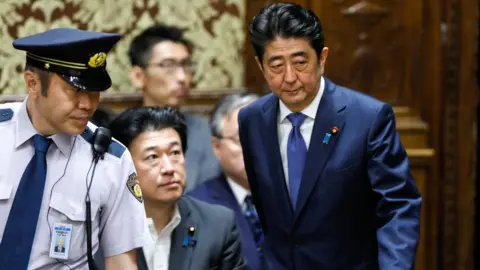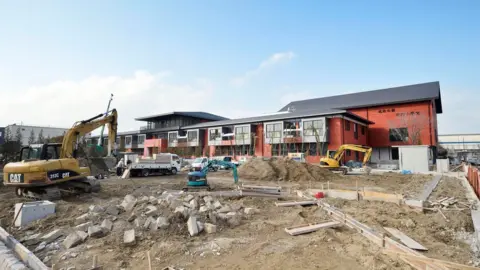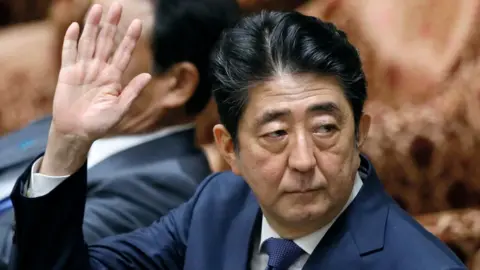Why is Japanese Prime Minister Shinzo Abe so unpopular?
 EPA
EPAJapan's Prime Minister Shinzo Abe is facing an uphill struggle amid plummeting ratings and a growing lack of confidence in his leadership.
The latest public opinion polls suggest support has dropped to less than 30%.
This week he is facing a tough grilling in both houses of parliament over claims he exploited his political power to help a long-time friend.
While Mr Abe insists he is innocent, the persistent allegations could threaten his political future.
The Japanese prime minister has weathered many a crisis in his career.
After a short-lived first stint as prime minister, he came to power in 2012 with sweeping promises to lift the economy out of years of stagnation.
He was until recently widely expected to run for - and win - a third term in 2018, which would make him the longest serving Japanese leader in the post-war era.
Where did it go wrong?
The sharp drop in approval ratings is attributed to string of recent scandals and the way that Mr Abe has handled them.
The current allegations that have led to the parliamentary grilling centre around accusations of personal favouritism.
Mr Abe, his critics say, used his position of power to help a personal friend win approval for a private veterinary school.
The case is largely based on allegations by a former official in the education ministry who claims that the approval was influenced by pressure from aides to the prime minister.
The approval appears to contradict a consensus that no new such schools are needed. For more than five decades not a single new one had been approved.
Fool me twice?
It is not the first time the Japanese prime minister has faced this kind of claim.
In March, a privately run primary school was found to have bought public land at a suspiciously low price.
The school was also under fire for its ultra patriotic curriculum, contradicting Japan's conscious post-war move away from nationalism.
The link to Mr Abe came via his wife who was listed as "honorary principal" of the school. Later, the head of the school testified that Mrs Abe gave a large donation to the school, allegedly in her husband's name.
 Kyodo/Reuters
Kyodo/ReutersThe scandal gripped the nation and set Mr Abe's approval ratings on a downward path, despite his denial of wrongdoing.
Adding up
Some of his policies are also ruffling feathers.
When in 2015 the Japanese government pushed through a shift in defence policy, approval ratings for Mr Abe took a hit, dropping to as low as 37%.
The reforms allowed for troops to fight overseas for the first time since World War Two and, to many Japanese, were a breach of the pacifist provisions in the constitution.
Mr Abe's declared intention to revise the constitution by 2020 so that it includes a paragraph formally legitimising the military is also proving very controversial.
Earlier this year, additionally, a new anti-terror law was pushed through, despite strong political and public opposition over concerns it harmed civil liberties.
These resentments against Mr Abe are currently resurfacing in a scandal around his Defence Minister Tomomi Inada.
Considered an Abe protégé, she is accused of involvement in a cover-up of documents about a sensitive peacekeeping operation involving Japanese soldiers in South Sudan.
Both Mrs Inada and the government deny claims logs showing a worsening security situation were concealed. But to critics the row is another example of a lack of government accountability to its citizens.
What's the fallout?
As had been widely expected, Monday's hearing in the lower house of parliament saw Mr Abe deny all allegations of favouritism.
He said he never instructed officials to give preferential treatment to his friend, and insisted the latter never sought such favours.
 EPA
EPAMr Abe is due to face the upper house on Tuesday where he is expected to deliver the same defence.
But with the prime minister's personal approval ratings plunging, he is being blamed for his party's defeats in recent local elections in Tokyo and Sendai.
Earlier this month, a leading conservative newspaper, the Yomiuri, said the government would not win back public trust "unless it overhauls its arrogant nature".
Japanese media are speculating whether the fallout might affect Mr Abe's chances at a third term.
The pressure on the embattled prime minister is so great that he has announced a major reshuffle of his cabinet this summer - and the changes he makes will be highly scrutinised.
